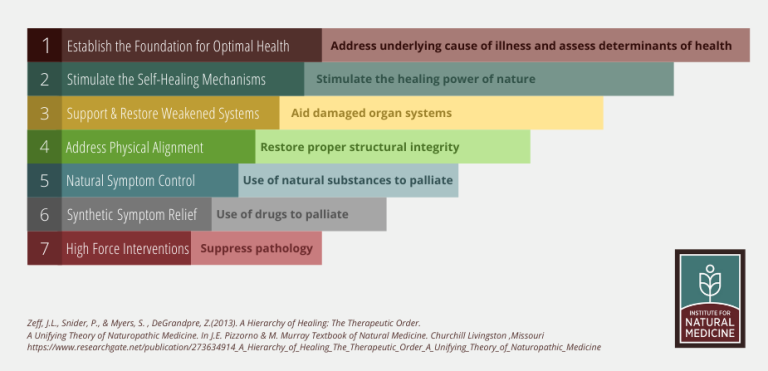Natural medicine takes a whole-person view of health, especially when it comes to nutrition. By viewing food as both fuel and medicine, naturopathic doctors place nutrition at the heart of patient care. Good nutrition supports energy, boosts immunity, stimulates healing, and reduces the risk of long-term illness.
In many areas of conventional medicine, nutrition doesn’t get the attention it deserves. Most doctors receive very little training about how diet affects health. For example, only 12 percent of osteopathic physicians are familiar with Dietary Reference Intakes, a key tool for tailoring nutrition to individual needs.1Hargrove EJ, Berryman DE, Yoder JM, Beverly EA. Assessment of nutrition knowledge and attitudes in preclinical osteopathic medical students. J Am Osteopath Assoc. 2017;117:622-633. As a result, many patients miss out on simple, effective ways to feel better and stay well.
Naturopathic doctors take a food-as-medicine approach
Naturopathic doctors (NDs) help fill this gap. Their nutrition training, similar in rigor to that of registered dietitians, prepares them to provide far more comprehensive dietary advice. With a strong foundation in primary care and a deep understanding of how food influences physiology, NDs offer personalized, evidence-based nutrition care that supports healing from the ground up.
NDs don’t simply offer a list of foods to eat or avoid. They assess each patient’s health concerns, lifestyle, and goals, then build targeted nutrition strategies to address root causes and support optimal wellness. This holistic, patient-centered approach helps people create lasting, meaningful change.
Inside the naturopathic nutrition curriculum
Over the course of their four-year, science-based, post-graduate training, ND students complete a series of in-depth nutrition courses. These are reinforced through real-world practice, including more than 1,200 hours of supervised patient care and hands-on learning in academic teaching kitchens, with key areas of training:
- Macronutrients: Biochemistry of proteins, fats, and carbohydrates and optimal intake
- Micronutrients: How the body uses vitamins and minerals, with an emphasis on absorption, storage, metabolism, and elimination
- Dietary assessment: Identifying nutritional deficiencies, dysfunctions, and dietary imbalances through individualized evaluation
- Nutrition therapy: When to recommend specific diets, such as whole-food, Mediterranean, ketogenic, low–FODMAP, and other evidence-based dietary plans, for health conditions and concerns
- Sociocultural factors: Exploring how attitudes, cultural backgrounds, and socioeconomic conditions shape dietary choices and outcomes.
- Clinical nutrition: Using diet and supplements to support all major body systems and treat conditions like irritable bowel disorder and cardiovascular disease
- Supplement–drug interactions: Understanding potential interactions between nutrients, botanicals, and pharmaceuticals
- Special populations: Including children, breastfeeding mothers, athletes, and individuals who need eating disorder support
- Technology in nutrition: Leveraging trusted apps, databases, and tools to support planning, adherence, and patient education
- Interprofessional collaboration: Working alongside registered dietitians when specialized support is needed

Compassionate, practical change
Changing how we eat can be one of the hardest health shifts to make, even when it’s medically necessary. Naturopathic doctors recognize that no two people have the same relationship with food. Finances, time, family responsibilities, cultural backgrounds, and personal preferences all affect what we eat and how we approach dietary change.
That’s why NDs meet patients where they are. They take the time to understand each person’s unique challenges and motivations, then co-create a step-by-step plan that feels doable and sustainable. This individualized, compassionate approach empowers patients to take an active role in their own healing, and that empowerment is often the key to lasting success.
JoAnn Yanez, ND, MPH, CAE, executive director of the Association of Accredited Naturopathic Medical Colleges; Taylor Arnold, PhD, RDN, assistant professor of nutrition at the Southwest College of Naturopathic Medicine; and Arianna Staruch, ND, contributed to this article.
Footnotes
- 1Hargrove EJ, Berryman DE, Yoder JM, Beverly EA. Assessment of nutrition knowledge and attitudes in preclinical osteopathic medical students. J Am Osteopath Assoc. 2017;117:622-633.






